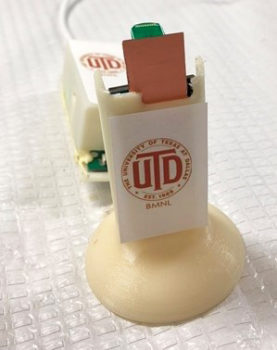[Video] Saliva Test For Cannabis Could Someday Help Identify Impaired Drivers
Washington, DC — In the U.S., those who consume alcohol and drive are often subjected to roadside stops, breathalyzer tests, and stiff penalties if their blood alcohol content exceeds certain limits. Currently, no such test exists for cannabis intoxication, although the substance is known to impair driving, among other activities. Scientists now report that they are one step closer to a convenient saliva test for measuring cannabis levels at roadside stops.
The researchers are presenting their results through the American Chemical Society (ACS) SciMeetings online platform.
Here’s a brand-new video on the research:
“People have the perception that driving after smoking marijuana is safer than driving drunk, but both substances can have similar effects, such as slowed reaction time, diminished alertness and reduced self-awareness,” says Shalini Prasad, Ph.D., who led the study. However, unlike alcohol, the blood level of the psychoactive compound in marijuana, tetrahydrocannabinol (THC), that constitutes impairment has not been well characterized. “This is an emerging field, but preliminary clinical reports suggest that anywhere above 1 to 15 nanograms of THC per milliliter of blood are considered a level of impairment,” Prasad says.
As more U.S. states decriminalize marijuana, law enforcement agencies are grappling with how to keep the roads safe from drivers who are high. Blood tests for THC, while accurate, are time-consuming and invasive, and many police officers lack the skills to perform such tests at roadside stops. Some researchers are working on devices that measure THC levels in-breath (similar to a breathalyzer for alcohol), but according to Prasad, levels of the substance are low in-breath, requiring extensive, error-prone data processing to filter out effects of other compounds. Because THC in saliva correlates closely with that in blood, Prasad and colleagues wanted to develop a simple, quick and accurate saliva test for the compound.

To do so, the researchers, who are at the University of Texas at Dallas, engineered THC sensor strips and an electronic reader. The sensor strips, which contained two electrodes, were coated with an antibody that binds THC so that the substance could be isolated from the many other compounds in saliva. “We used the antibody so that we could only look at the needle in the haystack,” Prasad says. To perform the test, the researchers added a tiny drop of human saliva spiked with THC to the strip and inserted it into the electronic reader, which applied a specific voltage. When THC attached to the antibody, the electrical current changed because of the polarization that occurred between the interacting antibody and THC surfaces. The e-reader converted these data into THC concentration.
The researchers found that the device was accurate for THC levels ranging from 100 picograms per milliliter to 100 nanograms per milliliter. “This is the first demonstration of a prototype device that can report both low and high concentrations of THC in a noninvasive, highly sensitive and specific manner,” Prasad says. The new test is also fast, requiring less than five minutes to complete from start to finish. In contrast, other saliva tests for cannabis must be performed in a lab, requiring trained personnel and time-consuming sample processing steps, such as dilution and buffer adjustments.
Because cannabis is illegal in Texas, the researchers haven’t been able to analyze saliva from people who have smoked marijuana. Instead, they’ve used saliva samples spiked with THC. But Prasad says she has seen a lot of interest from researchers in states where cannabis is legal who want to collaborate, as well as from local law enforcement agencies.
Now, the researchers are taking the saliva test out of the lab. They’ve made a field-deployable version of the device that is similar in size to the glucose monitors diabetics use. In preliminary testing, they’ve shown that they can obtain saliva from human volunteers through a simple cheek swab, spike the saliva with different concentrations of THC and perform the test in a setting similar to a roadside stop.
Prasad says that the new test is also likely to find applications outside of law enforcement. For example, the medical marijuana community has shown interest, as well as companies that develop lifestyle devices to help people manage their cannabis consumption. Also, lawmakers and regulatory groups are interested in using data generated by the device to develop effective laws.
The researchers acknowledge funding from the University of Texas at Dallas.
The American Chemical Society (ACS) is a nonprofit organization chartered by the U.S. Congress. ACS’s mission is to advance the broader chemistry enterprise and its practitioners for the benefit of Earth and its people. The Society is a global leader in providing access to chemistry-related information and research through its multiple research solutions, peer-reviewed journals, scientific conferences, eBooks and weekly news periodical Chemical & Engineering News. ACS journals are among the most cited, most trusted and most-read within the scientific literature; however, ACS itself does not conduct chemical research. As a specialist in scientific information solutions (including SciFinder® and STN®), its CAS division powers global research, discovery and innovation. ACS’s main offices are in Washington, D.C., and Columbus, Ohio.


